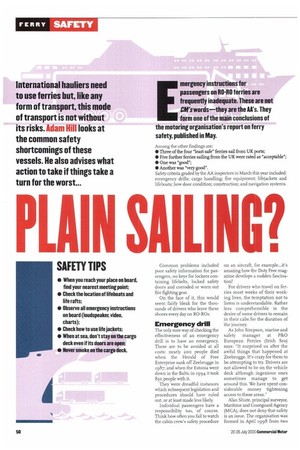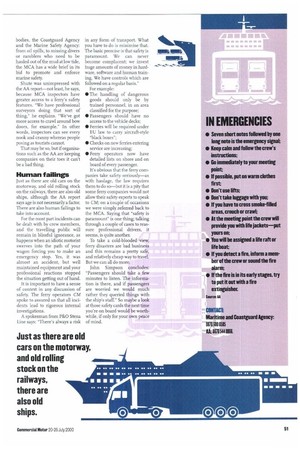Pill PISAILING?
Page 52

Page 53

If you've noticed an error in this article please click here to report it so we can fix it.
Common problems included poor safety information for passengers, no keys for lockers containing lifebelts, locked safety doors and corroded or worn out fire fighting gear.
On the face of it, this would seem fairly bleak for the thousands of drivers who leave these shores every day on RO-ROs.
Emergency drill
The only sure way of checking the effectiveness of an emergency drill is to have an emergency. These are to be avoided at all costs: nearly 200 people died when the Herald of Free Enterprise sank off Zeebrugge in 1987; and when the Estonia went down in the Baltic in I994 it took 850 people with it.
They were dreadful instances which subsequent legislation and procedures should have ruled out, or at least made less likely.
Individual passengers have a responsibility too, of course, Think how often you fail to watch the cabin crew's safety procedure on an aircraft, for example...it's amazing how the Duty Free magazine develops a sudden fascination!
For drivers who travel on ferries most weeks of their working lives, the temptation not to listen is understandable. Rather less comprehensible is the desire of some drivers to remain in their cabs for the duration of the journey.
As rohn Simpson, marine and safety manager at P&O European Ferries (Irish Sea) says: "It surprised us after the awful things that happened at Zeebrugge. It's crazy for them to be attempting to try. Drivers are not allowed to be on the vehicle deck although ingenious ones sometimes manage to get around this. We have spent considerable money tightening access to these areas."
Alan Shute, principal surveyor. Maritime and Coastguard Agency (MCA), does not deny that safety is an issue. The organisation was formed in April 1998 from two bodies, the Coastguard Agency and the Marine Safety Agency: from oil spills, to missing divers or ramblers who need to be hauled out of the mud at low tide, the MCA has a wide brief in its bid to promote and enforce marine safety.
Shute was unimpressed with the AA report—not least, he says, because MCA inspectors have greater access to a ferry's safety features. "We have professional surveyors doing that sort of thing," he explains. "We've got more access to crawl around bow doors, for example." In other words, inspectors can see every nook and cranny whereas people posing as tourists cannot.
That may be so, but if organisations such as the AA are keeping companies on their toes it can't be a bad thing.
Human failings
Just as there are old cars on the motorway, and old rolling stock on the railways, there are also old ships, although the AA report says age is not necessarily a factor. There are also human failings to take into account.
For the most part incidents can be dealt with by crew members, and the travelling public will remain in blissful ignorance, as happens when an idiotic motorist swerves into the path of your wagon forcing you to make an emergency stop. Yes, it was almost an accident, but well maintained equipment and your professional reactions stopped the situation getting out of hand.
It is important to have a sense of context in any discussion of safety. The ferry operators CM spoke to assured us that all incidents lead to rigorous internal investigations.
A spokesman from MO Stena Line says: "There's always a risk in any form of transport. What you have to do is minimise that. The basic premise is that safety is paramount. We can never become complacent; we invest huge amounts of money in hardware, software and human training. We have controls which are followed on a regular basis."
For example: • The handling of dangerous goods should only be by trained personnel, in an area classified for the purpose; • Passengers should have no access to the vehicle decks; • Ferries will be required under EU law to carry aircraft-style "black boxes"; • Checks on new ferries entering service are increasing; • Ferry operators now have detailed lists on shore and on board of every passenger.
It's obvious that the ferry companies take safety seriously—as with haulage, the law requires them to do so—but it is a pity that some ferry companies would not allow their safety experts to speak to CM; on a couple of occasions we were simply referred back to the MCA. Saying that "safety is paramount is one thing; talking through a couple of cases to reassure professional drivers, it seems, is quite another.
To take a cold-blooded view, ferry disasters are bad business and this remains a pretty safe, and relatively cheap way to travel. But we can all do more.
John Simpson concludes: "Passengers should take a few minutes to listen. The information is there, and if passengers are worried we would much rather they queried things with the ship's staff." So maybe a look at those safety cards the next time you're on board would be worthwhile, if only for your own peace of mind.




















































































































